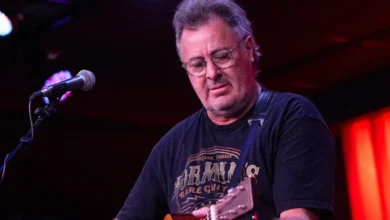Eddy Arnold And LeAnn Rimes Showcased A Remarkable Yodeling Duel In Their “Cattle Call” Rendition
Eddy Arnold, born on May 15, 1918, in Henderson, Tennessee, emerged as one of the most influential figures in country music. His musical career began in the 1940s when he blended elements of traditional country with pop influences, creating a sound that appealed to a broad audience. Arnold’s smooth, baritone voice, combined with a flair for storytelling, allowed him to express the emotions and trials of everyday life, especially in rural settings. Arnold’s ability to yodel became a distinctive trait of his performances, helping him to carve out a niche in the competitive music industry of the time.
His recording of “Cattle Call” in 1944 is a perfect illustration of his artistic approach, combining his smooth vocalization with captivating yodeling. The song tells the story of a cowboy who communicates with cattle through a melodic call, capturing an essential aspect of cowboy culture and life on the range. The imagery in the lyrics, alongside Arnold’s vocal delivery, paints a vivid picture of the American West, invoking feelings of nostalgia for simpler times and the rugged lifestyle of cowboys.
The success of “Cattle Call” marked a significant milestone in Arnold’s career, helping him secure a place among the top artists in country music. The song’s journey to the top of the Billboard Juke Box Folk Records chart demonstrated Arnold’s commercial viability and the effectiveness of his artistic identity in connecting with audiences. The yodeling in the refrain not only showcased his vocal talent but also reinforced the authenticity of the cowboy experience, which resonated deeply with listeners.
As the years went by, “Cattle Call” became more than just a hit song; it evolved into an enduring classic that resonated across generations. Various artists, including renowned figures like Elvis Presley, have covered it, each adding their interpretation to the fundamental elements of the tune. Presley’s version, found on his 1969 album “From Elvis in Memphis,” breathed new life into the song and introduced it to a younger audience, demonstrating the song’s versatility and timelessness.
The song also reflects the broader stylistic trends in American music during its time. The mid-20th century saw the rise of Western swing, a genre that blended country music with jazz and big band sounds. Eddy Arnold was adept at this fusion, exemplifying a smooth and polished style that caught the attention of many listeners. His performances typified the Western swing sound that characterized the era, appealing to both traditional country fans and those who favored more contemporary pop styles.
Beyond its commercial success, “Cattle Call” has been celebrated for its cultural significance within the American music narrative. The cowboy, symbolizing independence, connection to the land, and a way of life that many romanticize, is brought to life through the song’s lyrics. This connection to the cowboy archetype speaks to a deeper cultural narrative within American society, exploring themes of freedom, resilience, and the bond between humans and their environment.
Moreover, the evolution of country music has seen “Cattle Call” being embraced by new generations of artists and fans. This legacy continues as the song is frequently performed at country music festivals, gatherings, and honky-tonks, serving as a reminder of the genre’s roots and the enduring charm of classic tunes. Its melody and lyrics frequently evoke a sense of nostalgia, as audiences fondly recall the imagery of cowboys and their cattle, taking them back to the essence of Americana.
Eddy Arnold’s contribution to the country music landscape extends far beyond “Cattle Call.” His pioneering efforts in blending various musical styles helped to shape the sound of country music in the mid-20th century and laid the groundwork for future artists. Over his career, Arnold scored numerous hits, establishing himself as a beloved figure in the industry. His talent and influence are still felt today in the works of modern country artists who draw inspiration from his signature sound and approach to storytelling in music.
As country music continues to evolve within the contemporary musical landscape, the impact of songs like “Cattle Call” is still evident. They serve as touchstones, connecting audiences to the historical roots of the genre while also allowing for reinterpretation and renewal in today’s music scene. This timeless song represents not only the artistry of Eddy Arnold but also the cultural fabric of America, celebrating the cowboy spirit and the tradition of storytelling that is at the heart of country music.





